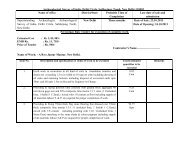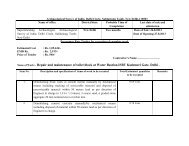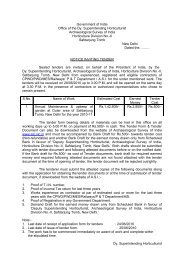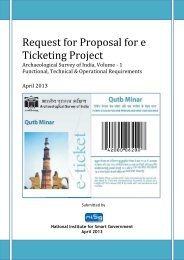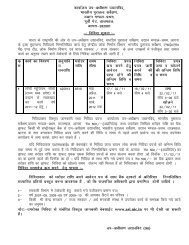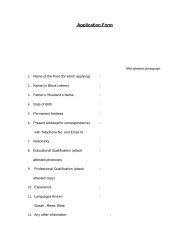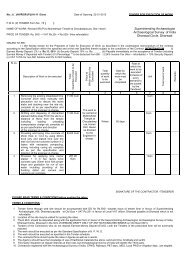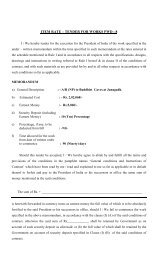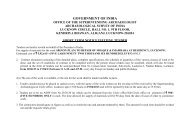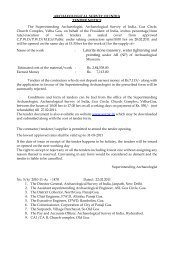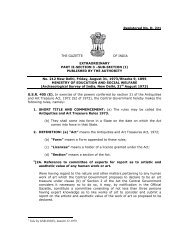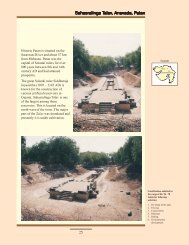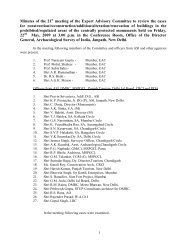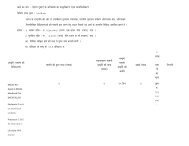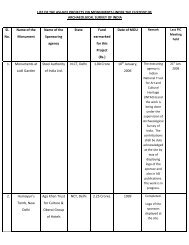Guidelines for Approval - Archaeological Survey of India
Guidelines for Approval - Archaeological Survey of India
Guidelines for Approval - Archaeological Survey of India
You also want an ePaper? Increase the reach of your titles
YUMPU automatically turns print PDFs into web optimized ePapers that Google loves.
GUIDELINES FOR GRANTING APPROVAL OF<br />
THE CENTRAL GOVERNMENT FOR EXCAVATION<br />
01 Complete in<strong>for</strong>mation<br />
The applicants must supply complete in<strong>for</strong>mation in pro<strong>for</strong>ma as<br />
prescribed. Proposals with incomplete in<strong>for</strong>mation will be returned back to<br />
the applicants, after the preliminary scrutiny, indicating the missing<br />
in<strong>for</strong>mation.<br />
The applicant however can resubmit his proposal after including the<br />
missing in<strong>for</strong>mation. If the complete in<strong>for</strong>mation is not received be<strong>for</strong>e the<br />
meeting <strong>of</strong> the Standing Committee (SC) <strong>of</strong> the Central Advisory Board <strong>of</strong><br />
Archaeology (CABA), the proposal would not be considered <strong>for</strong> approval.<br />
02 Proposals from institutions<br />
The application made on behalf <strong>of</strong> an institution, must be signed by the<br />
Head <strong>of</strong> the institution.<br />
In case <strong>of</strong> universities, the proposal made by the Pr<strong>of</strong>essors or any other<br />
individual and not signed by the Registrar <strong>of</strong> the University would not be<br />
considered <strong>for</strong> approval.<br />
03 Separate proposals<br />
Separate proposals must be submitted <strong>for</strong> excavations at different sites.<br />
Proposals mentioning more than one site would be summarily rejected.<br />
04 Location <strong>of</strong> the site<br />
Complete location and details <strong>of</strong> the site including name <strong>of</strong> ancient mound,<br />
name <strong>of</strong> locality - village/ town, taluka, district and state along with geocoordinates<br />
should be mentioned. A proposal with sketchy location is liable<br />
to be summarily rejected.<br />
05 Previous exploration and excavation<br />
Excavation should be taken only if necessary and as the last step in the<br />
process <strong>of</strong> field study. It is, there<strong>for</strong>e, very important to study the site in<br />
detail using nondestructive methods, be<strong>for</strong>e carrying out excavation.<br />
The importance <strong>of</strong> the site could be accessed by the nature <strong>of</strong> antiquities<br />
found in previous explorations and excavation. Excavation on the sites will<br />
not be permitted unless the potentiality <strong>of</strong> site is known earlier through<br />
detailed explorations or any excavation conducted earlier.<br />
However, salvage excavation at any particular site in view <strong>of</strong> its<br />
disappearance or important findings, chance discoveries may be permitted<br />
1
as exceptions.<br />
06 Purpose <strong>of</strong> excavation<br />
Every excavation should have specific purpose. If the purpose can be<br />
solved by other means without excavation priority should be accorded to<br />
them.<br />
07 Area <strong>of</strong> excavation<br />
No blanket permission to excavate in any area can be granted and it is<br />
essential that the area <strong>of</strong> excavation be clearly defined. The applicant<br />
should study the site in detail and decide the area <strong>of</strong> excavation be<strong>for</strong>e<br />
putting up the proposal. A detailed plan <strong>of</strong> the site showing in red outlines<br />
the extent <strong>of</strong> the proposed excavation or operation to be attached with the<br />
proposal.<br />
08 Duration <strong>of</strong> excavation<br />
For successful completion and achieving the goal <strong>of</strong> any excavation it is<br />
necessary that the excavation be planned in detail. Proposed duration <strong>of</strong><br />
the excavation or operation and date <strong>of</strong> commencement <strong>of</strong> the excavation<br />
should be decided keeping the availability <strong>of</strong> funds, and other factors in<br />
view. Applicant should adhere to the time schedule mentioned in the<br />
proposal, unless there are unavoidable reasons to do so. In that case the<br />
applicant must in<strong>for</strong>m the changed schedule to the authorities <strong>of</strong> Central<br />
Government as well as State Government in advance.<br />
It will help in preparing a national calendar <strong>for</strong> excavations that will<br />
facilitate archaeologists, archaeological <strong>of</strong>ficers, researchers and students<br />
to visit various excavation sites.<br />
09 Funds <strong>for</strong> excavation<br />
Applicants not having sufficient funds to meet the required expenditure on<br />
the proposed excavation or operation will not be given approval <strong>for</strong><br />
excavation. Besides fieldworks, sufficient funds should also be earmarked<br />
<strong>for</strong> preparation <strong>of</strong> excavation report.<br />
Institutions having limited funds and undertaking number <strong>of</strong> excavations<br />
should be advised to concentrate their resources at lesser number <strong>of</strong> sites<br />
to carryout systematic work with detailed scientific study, such as absolute<br />
dating, study <strong>of</strong> flora and fauna, sample analysis, etc.<br />
10 Director <strong>of</strong> excavation<br />
Excavation at any site must be conducted under the direction <strong>of</strong> one<br />
Director, only.<br />
The excavation will not be approved merely on the basis <strong>of</strong> the status <strong>of</strong><br />
the Director. He must have enough experience to handle the excavation.<br />
2
The Director <strong>of</strong> excavation must have participated in at least five<br />
excavations during a period <strong>of</strong> five years and during this period he should<br />
have actually worked in the excavations <strong>for</strong> not less than twelve months.<br />
Except, under exceptional circumstances, which are to be recorded in<br />
writing, Director <strong>of</strong> the excavation should not be changed.<br />
11 Equipments and staff<br />
The applicant must have sufficient trained staff and instruments required<br />
<strong>for</strong> the proposed excavation. Applicants not having sufficient photographic,<br />
surveying and other equipments <strong>for</strong> the excavation and documentation will<br />
not be permitted to excavate.<br />
12 Collaboration<br />
Collaboration between various institutions specializing in various fields <strong>of</strong><br />
archaeology and science should be encouraged. Role <strong>of</strong> various<br />
collaborative agencies should be well defined.<br />
In case <strong>of</strong> collaboration with <strong>for</strong>eign agency, it would be the responsibility<br />
<strong>of</strong> <strong>India</strong>n collaborator to ensure that the excavated material is kept in safe<br />
custody and the provisions <strong>of</strong> the Ancient Monuments and <strong>Archaeological</strong><br />
Sites and Remains Act, 1958 are implemented.<br />
No archaeological samples should be exported without the approval <strong>of</strong> the<br />
Director General, <strong>Archaeological</strong> <strong>Survey</strong> <strong>of</strong> <strong>India</strong>.<br />
13 Publication <strong>of</strong> excavation reports<br />
No excavation is complete till its report is published and made available to<br />
public. Publication <strong>of</strong> excavation report is the integral and the most<br />
important part <strong>of</strong> any excavation. It <strong>of</strong>ten takes long time in preparing<br />
drawings, analysis <strong>of</strong> finds and samples, description <strong>of</strong> antiquities, etc. An<br />
excavator must publish the report <strong>of</strong> his excavation within five years <strong>of</strong><br />
completion <strong>of</strong> excavation.<br />
Those who have not published / submitted complete report <strong>of</strong> excavation(s)<br />
conducted be<strong>for</strong>e five years will not be permitted to take up any other<br />
excavation till their previous report(s) are submitted / published.<br />
Those (Director) who have excavated more than FIVE sites during last five<br />
years and have not submitted excavation reports will also not be permitted<br />
to take up any excavation on new sites, till the reports <strong>of</strong> their earlier<br />
excavations are completed.<br />
Any applicant (individual as well as institution) who has excavated more<br />
than TEN sites in last three years and has not submitted a copy <strong>of</strong> their<br />
3
detailed reports to the ASI will not be permitted to take up further<br />
excavation on new sites.<br />
However, if necessary, only ongoing projects can be approved that too in<br />
such a way that no excavation at any particular site exceeds three seasons.<br />
14 Excavations by the Director <strong>of</strong> excavation<br />
Any approval not mentioning the details <strong>of</strong> the excavations carried out by<br />
the Director <strong>of</strong> excavation and the stage <strong>of</strong> publication <strong>of</strong> previous<br />
report(s) <strong>of</strong> excavation(s) taken up by the Director will not be approved.<br />
15 Brief annual report<br />
Every proposal must have the brief report on work(s) carried out by the<br />
applicant during the last season as per approved programme. This annual<br />
report must contain sufficient details <strong>of</strong> the works carried out, findings<br />
made, objectives <strong>of</strong> the excavation and the achievements, section and<br />
antiquity drawings, plan <strong>of</strong> the site showing the location and size <strong>of</strong><br />
trenches, illustrations clearly showing the work done on the site, exposed<br />
structures and important findings. In case <strong>of</strong> the ongoing projects, the<br />
approval should be granted on the basis <strong>of</strong> the report only.<br />
Proposals not including the brief report on the work(s) carried out by the<br />
applicant during the last season, as per approved programme, should not be<br />
approved.<br />
16 Other relevant in<strong>for</strong>mation<br />
Any other relevant in<strong>for</strong>mation furnished by the applicant may be<br />
considered <strong>for</strong> approval <strong>of</strong> the proposal.<br />
17 <strong>Approval</strong> <strong>of</strong> the State Governments<br />
Proposal <strong>for</strong> any excavation will not be considered <strong>for</strong> approval without the<br />
approval <strong>of</strong> the state government.<br />
18 Recommendations to be recorded<br />
All the proposals will be signed by the SC <strong>of</strong> the CABA and their<br />
recommendations and decisions will be recorded.<br />
19 Decision to be conveyed<br />
Decision <strong>of</strong> the Central Government should be conveyed to all the<br />
applicants.<br />
20 Number <strong>of</strong> excavations<br />
Any Director should not be allowed to take up more than TWO excavations<br />
in a field season.<br />
Limited excavations would help in utilizing the staff, equipments and funds<br />
4
to carryout systematic excavation with detailed analysis. This in turn would<br />
bring better results and help in faster preparation <strong>of</strong> reports.<br />
21 Explorations<br />
Despite over a century <strong>of</strong> systematic field studies many parts <strong>of</strong> the<br />
country remains unexplored. Institutions should be encouraged to take up<br />
explorations and discover archaeological sites rather than digging known<br />
ancient mounds.<br />
Young archaeologists <strong>of</strong> the State Departments <strong>of</strong> Archaeology and<br />
research students working under experienced guides in recognized<br />
universities may also be allowed to take up systematic explorations as a<br />
part <strong>of</strong> their duty or approved research work.<br />
Detailed reports on these explorations, discoveries and finds should be<br />
submitted as soon as the research project is completed.<br />
5



